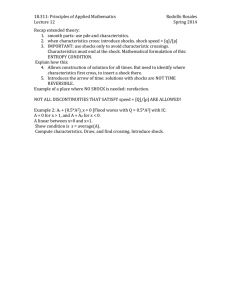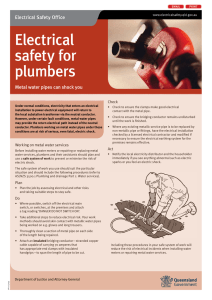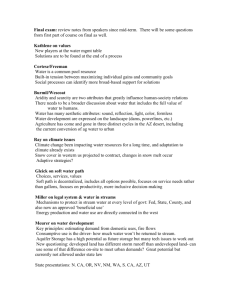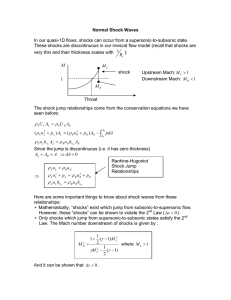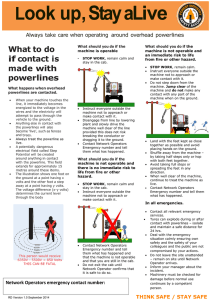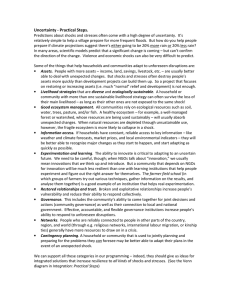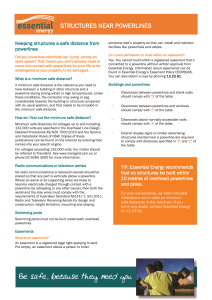Electrical Shocks - Essential Energy
advertisement
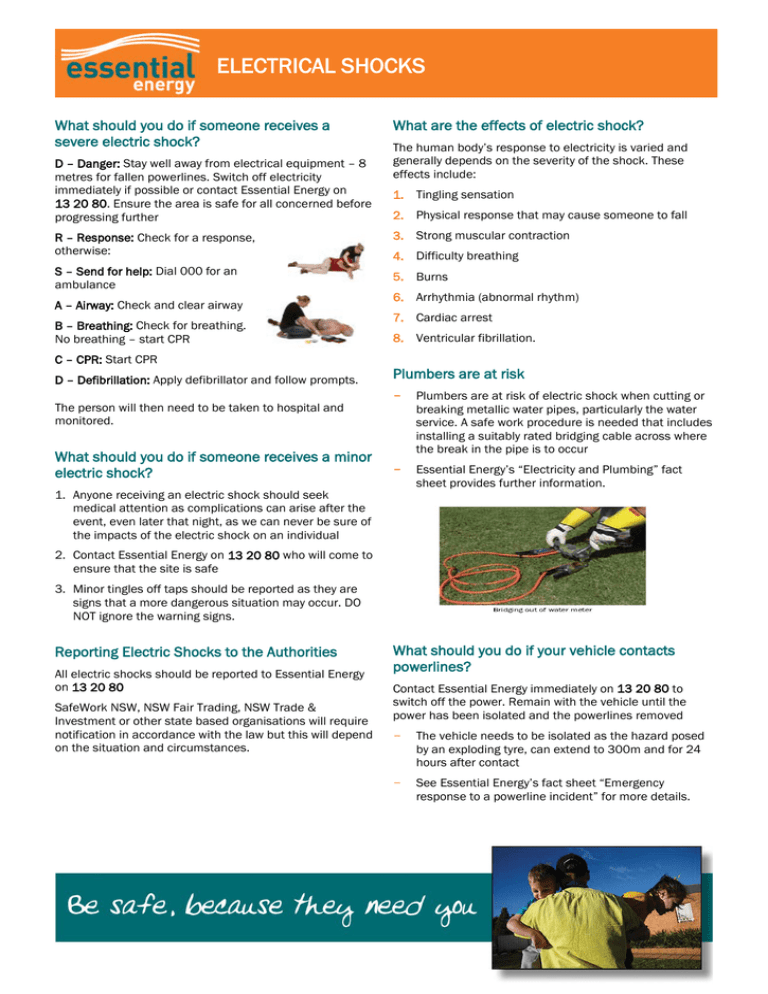
ELECTRICAL SHOCKS What should you do if someone receives a severe electric shock? D – Danger: Stay well away from electrical equipment – 8 metres for fallen powerlines. Switch off electricity immediately if possible or contact Essential Energy on 13 20 80. Ensure the area is safe for all concerned before progressing further What are the effects of electric shock? The human body’s response to electricity is varied and generally depends on the severity of the shock. These effects include: 1. Tingling sensation 2. Physical response that may cause someone to fall R – Response: Check for a response, otherwise: 3. Strong muscular contraction S – Send for help: Dial 000 for an ambulance 5. Burns A – Airway: Check and clear airway B – Breathing: Check for breathing. No breathing – start CPR C – CPR: Start CPR D – Defibrillation: Apply defibrillator and follow prompts. The person will then need to be taken to hospital and monitored. What should you do if someone receives a minor electric shock? 4. Difficulty breathing 6. Arrhythmia (abnormal rhythm) 7. Cardiac arrest 8. Ventricular fibrillation. Plumbers are at risk - Plumbers are at risk of electric shock when cutting or breaking metallic water pipes, particularly the water service. A safe work procedure is needed that includes installing a suitably rated bridging cable across where the break in the pipe is to occur - Essential Energy’s “Electricity and Plumbing” fact sheet provides further information. 1. Anyone receiving an electric shock should seek medical attention as complications can arise after the event, even later that night, as we can never be sure of the impacts of the electric shock on an individual 2. Contact Essential Energy on 13 20 80 who will come to ensure that the site is safe 3. Minor tingles off taps should be reported as they are signs that a more dangerous situation may occur. DO NOT ignore the warning signs. Reporting Electric Shocks to the Authorities All electric shocks should be reported to Essential Energy on 13 20 80 SafeWork NSW, NSW Fair Trading, NSW Trade & Investment or other state based organisations will require notification in accordance with the law but this will depend on the situation and circumstances. What should you do if your vehicle contacts powerlines? Contact Essential Energy immediately on 13 20 80 to switch off the power. Remain with the vehicle until the power has been isolated and the powerlines removed - The vehicle needs to be isolated as the hazard posed by an exploding tyre, can extend to 300m and for 24 hours after contact - See Essential Energy’s fact sheet “Emergency response to a powerline incident” for more details. How do you prevent electric shocks? For more information 1. Essential Energy’s Public Safety team is available to facilitate Electrical Awareness sessions and discuss any questions relating to electrical safety. It is important to avoid contact with underground or overhead powerlines. To keep safe follow these easy steps before commencing work: a. Spot any hazards – they may not be obvious, consider the work to be done b. Assess the risks from these hazards. What are the possible outcomes? General enquiries 13 23 91 c. Fix the problem so it is safe to commence work Power outages 13 20 80 d. Evaluate the effectiveness of the solutions you have put in place - do they work? 2. Stay away from fallen powerlines 3. Contact Essential Energy on 13 20 80 if your ball goes over a substation fence 4. Hire professional and authorised tree trimmers to trim trees near powerlines or contact Essential Energy for advice 5. Safety switches are the best way of preventing electric shocks and electrocutions in the home or business premise. Ask your electrician to fit them if you don’t already have them 6. Test your safety switches regularly by pushing the test button – at least every 6 months as they can become faulty. Electrical contractors can test safety switches fully 7. Maintain your electrical wiring and equipment in good order 8. Be careful with electrical equipment around water 9. Never stick objects in toasters or powerpoints 10. Do not attempt electrical wiring or repairs yourself. Always call an electrical contractor 11. Turn off appliances before disconnecting them. Hold the plug to remove it – DO NOT pull on the lead. For more information on electrical safety please call Essential Energy: Follow us or visit essentialenergy.com.au/safety Essential Energy recommends you familiarise yourself with the latest SafeWork NSW Code of Practice ‘Work near Overhead Powerlines’ which can be viewed at: www.safework.nsw.gov.au or you can purchase a copy of the Code of Practice by contacting SafeWork NSW on 13 10 50. SAFETY FIRST: • Apply first-aid as soon as it is safe to do so – switch off the electricity • People receiving an electric shock should seek medical attention • Contact Essential Energy to report all shocks including “tingles” even off taps • Conduct a risk assessment before working near powerlines • Install safety switches • DO NOT attempt electric wiring or repairs yourself. Always call an electrical contractor
